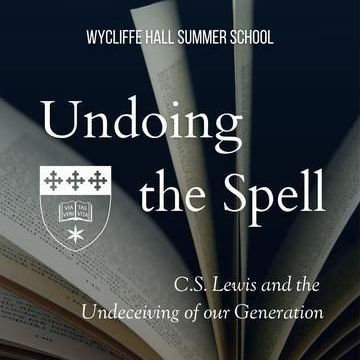Reinhabiting our Story: A Sermon on Ezra 6:19-22
A sermon on Ezra 6:19-22, given in Wycliffe Chapel on Tuesday 11th March 2025.
******
My favourite thing about moving house?
When it comes to moving house, there are a few moments that I really enjoy. Most of it, I could do without, but there are a couple of key markers that I really do like.
The first is when, after all your worldly goods have been packed up and moved into the new house, you unpack enough to have a place to sit down and enjoy a cup of tea. Maybe even enough to have the TV set-up, so you can watch a show while you eat pizza and recover from all the hard work. A corner of normal amidst a sea of moving boxes and furniture. It feels good!
And there are other moments along the road too. When a room is completely unpacked. When the kitchen is finally organised enough that you can cook. Little moments of joy, amidst the chaos of moving boxes, as you establish life in a new place.
But my favourite is the one that might not come till a week or two—or month or two—later: when the pictures are hung on the walls. Those cherished items we’ve accumulated over time that are visible reminders of the key moments, people and things that have happened to get you to where you are.
Getting the pictures on the walls makes the house not just anyone’s house, but uniquely our house. The McBays. From the Mexican framed mirrors, ordination gifts, pieces of art crafted by family and friends. Wedding photos and pictures of places we’ve called home.
It’s not the Lloyds’. The Terrys’. Certainly not the Screnocks’. It’s our story. [These names are a reference to the families of three much loved—and respected!—colleagues.]
Ezra 6 and putting up pictures
So, I invite you today to indulge me in this analogy, which might be a bit of a stretch: perhaps what we have here in Ezra 6, and the description of the first Passover after the exile, is maybe just a little bit like the putting up of pictures on the walls of your home after a house move.
If you need some convincing, here’s why: because what we have in Ezra 6 is (a) the end of journey to a new home and (b) a visible remembrance of the story of how they came to be.
(a) Ezra 6: The end of a long journey
We have been on a long journey through first 6 chapters of Ezra. The oh-so lengthy recounting of all the names of all the people who made the trip from Babylon back to Judah. The beginning of laying the foundations of the temple. The complications and setbacks of getting it built. Finally getting it done, installing the priests and Levites and last week, having it all dedicated.
The next chapter (Ezra 7) jumps into the arrival of Ezra on the scene: taking us decades forwards in the story.
These verses are the close to the opening act. The end of a long beginning.
(b) Ezra 6: A visible remembrance of their story
While the reading today is just four verses long, they describe an important moment of remembrance of how the people of Israel came to be.
At the end of the journey back to Jerusalem, they celebrate Passover and the festival of unleavened bread. In doing so, they remember their story. The story of how they came to be a freed people in the first place, how they’d been delivered out of an oppressive and burdensome existence in Egypt. A story of a God who had heard their cries and struggles for help. A story that concluded with the first entry into the Promised Land.
A story retold again and again throughout Scripture. Remembered and rehearsed.
Importantly, it was not just the story that reminded them of who they were, but it was a story that reminded them of who their God is.
Ezra 6: A lot more than just putting up pictures
But of course, Ezra 6 is also a whole lot more than putting up cherished photos and pictures around your house, even if those pictures tell stories about the life you’ve lived.
Photos on a wall are static. They aren’t like paintings in Harry Potter which you can at least converse with. Nor are they like the chalk drawings in Mary Poppins that Mary and Bert jump into; where they get to go to the races and dance with penguins.
Pictures in a home might bring a smile to your face or a thought to your mind of precious memories, but then you get back to the business of your day.
But in Passover, the people embodied a story through a physical act of worship, though preparation and purification—and then through participation in the meal itself.
Through their observance of Passover, the distant past, the stories of their ancestors, became the story of the returned exiles. Remembering this story of God’s deliverance was a re-embodiment of the story where the God who did that for them now is now doing it for us.
Ezra 6: a diligent observance of Passover
Our reading is pretty clear that when it came to celebrating Passover, the people were diligent in that re-enactment—something that had not always been the case. 2 Chronicles 30 describes another Passover (during Hezekiah’s reign) that was a month delayed, with issues around preparedness and purification that left the Levites ashamed and meant Hezekiah had to plead for extra grace from God.
But not so with the returned exiles! Ezra 6 is painstakingly clear they didn’t make the same mistakes, but participating faithfully as God’s people and keeping the covenant he made with them. For it was observed on the 14th day of the 1st month just as commanded (cf. Leviticus 23). All the priests and levites were purified and clean in preparation for it, right on time. Everyone present was fit to receive, and had duly separated themselves and become clean.
All of the priests and Levites. All of the people of Israel. Before the God of Israel.
Ezra’s Passover: diligent but different
Notice the conclusion to the account in v.22:
“With joy they celebrated the Festival of Unleavened Bread for seven days, for the Lord had made them joyful and had turned the heart of the king of Assyria to them, so that he aided them in the work on the house of God, the God of Israel.”
In the remembering an old story, it starts to take on new meaning. Yes, Passove is about remembering the story of the God who delivered them out of slavery in Egypt, but now they know something new about this God who delivers. He also delivers from captivity in Babylon. A captivity and judgement that was a result of their sin. A result of their idolatry.
*
I don’t know about you, but I find it much easier to accept grace when it’s for something that’s not my fault. I’m not a huge fan of asking for help, but I can usually get there when needed.
What I think many of us find harder, is accepting grace when it’s for something that is our responsibility. When we did know better, but we blew it.
Grace when I’ve been the recipient of injustice can feel quite different to receiving grace when I’m the instigator of it. When I’ve caused hurt to others. When I’ve looked the other way. When I’ve taken advantage. When I’ve acted out of fear, jealousy, shame or indifference.
But here the people of God were: now remembering both the grace God showed in the Exodus and rejoicing for their experience of God’s grace in restoring them from Exile. And not just in half-measure. A full restoration. A temple built where God would dwell again with His people. Grace upon grace.
God’s promise that exile would not be forever, that should they turn back and seek him, he would restore? It was all true.
And here they were, experiencing the fruit of it and seeing God turn the heart of the king to make it all possible.
He had made them joyful.
Jesus and the Passover
In the reading from John’s gospel, it makes it clear that Jesus is to be considered our paschal lamb. The sacrifice to be offered for us in our slavery. In John’s account in chapter 19, Jesus was crucified at the time when the Levites and Priests would have been slaughtering the lamb for the Passover meal.
A sacrifice for us.
It’s a story we remember in church every time we have communion together. It’s a story we’ll remember at Maundy Thursday services and Good Friday in just a few weeks.
But don’t let it be a story of your past only.
A testimony to unfold over a lifetime
I remember when I first was asked to “give my testimony” and wondered what on earth I should say, because I didn’t really have a “before Jesus” story. I couldn’t speak of a life without God. There was no radical conversion or spiritual rag-to-riches story that I thought I should have.
But over the years, with life’s ups and downs—and some pretty bleak downs at times—God showed me that the story of deliverance—the story of Passover, the story of the exile and the the story of the Cross—was a story for me too.
Israel’s understanding of God broadened and deepened as God continued to work with His people. It took on new meaning. It brought great joy.
In a few moments we’re going to say the Creed together—and what better way to remember our story? As we do, I encourage you to think about the story of deliverance God has done, the one he is presently doing or the one that perhaps you’re trusting he will do at the right time.
Keep faithfully, diligently, remembering the story God has given you. And by His Spirit, keep letting him bring more of your life into that story.
******
Subscribe to
My Newsletter
Sign up here to receive quarterly updates (and occasional other news blasts) about how ministry is going and our move to the U.K.



